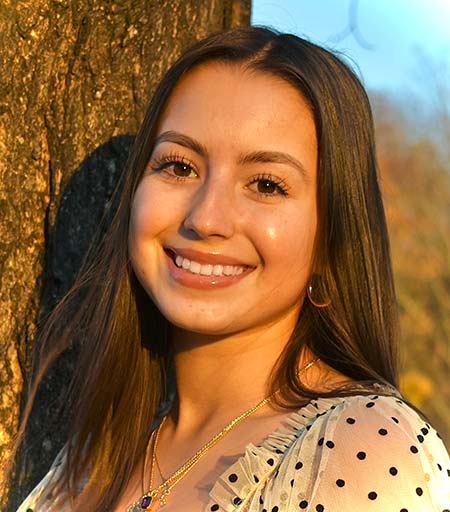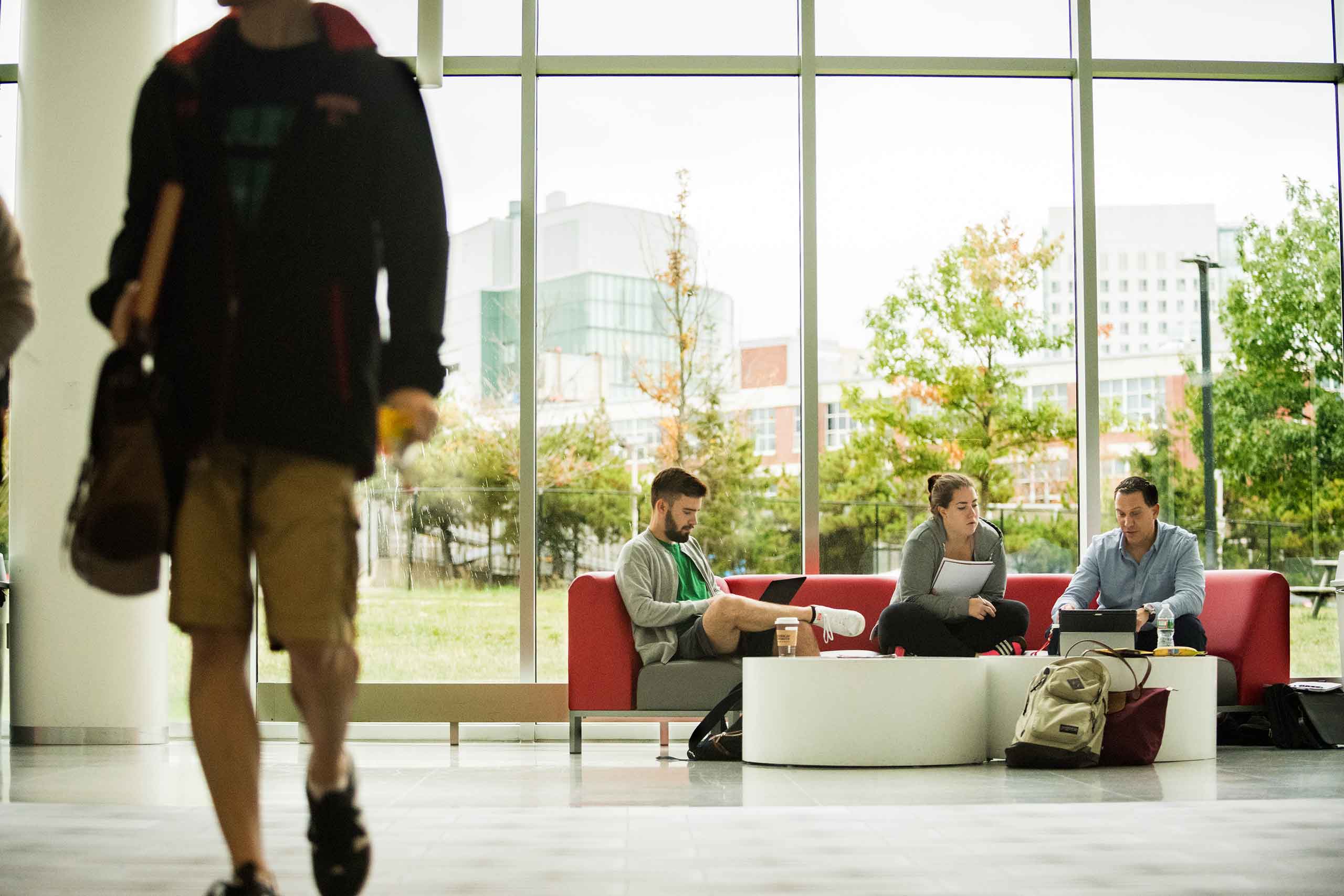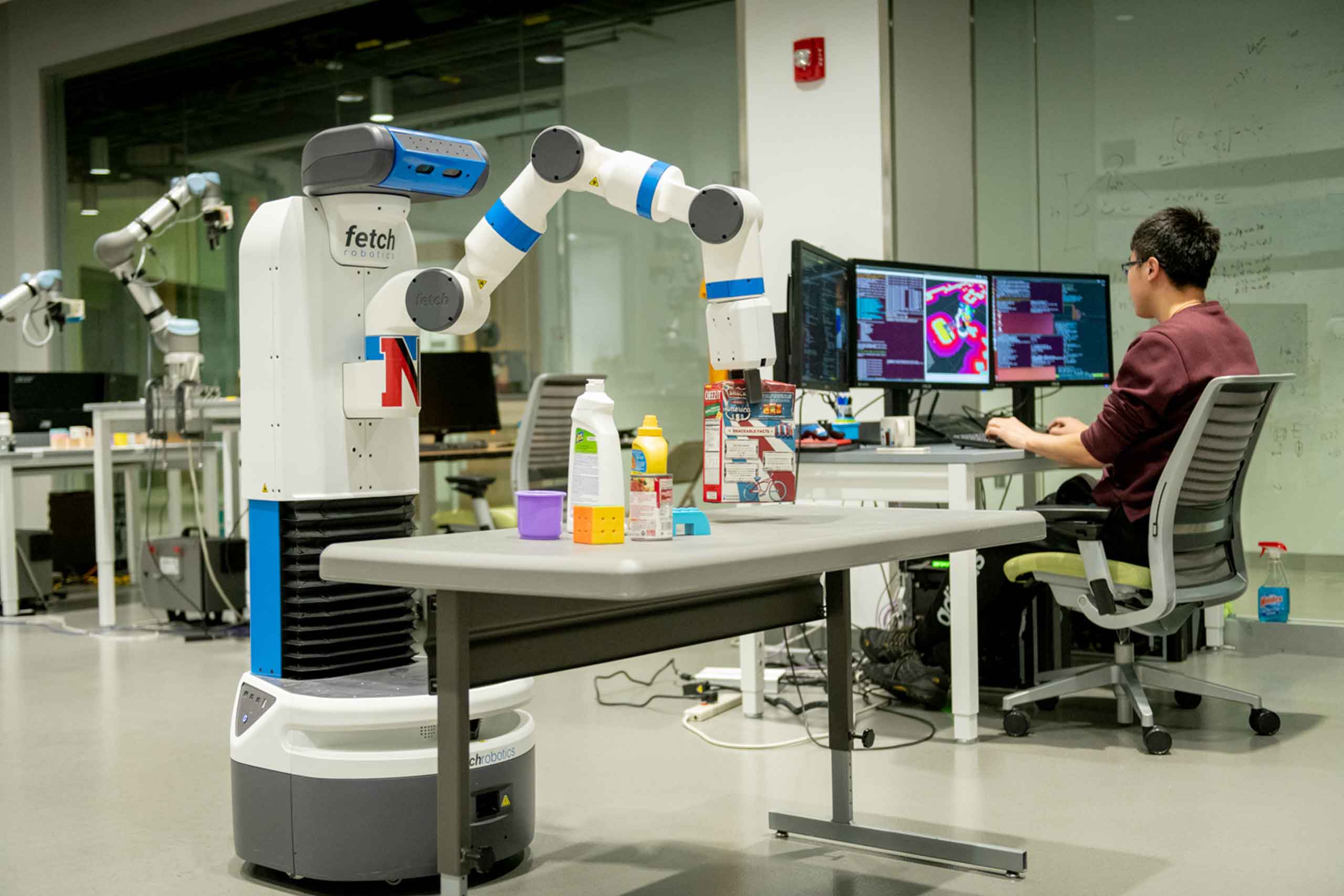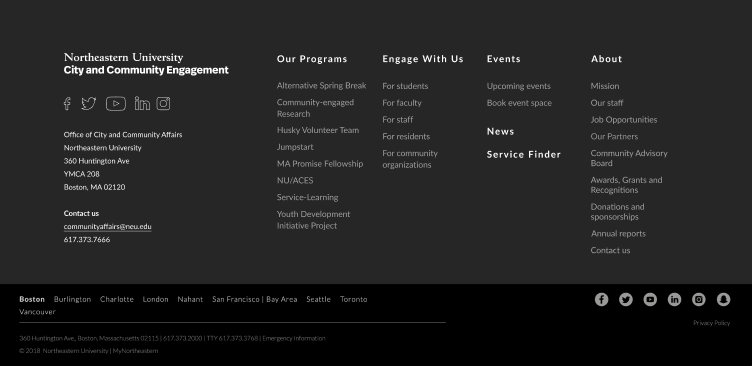

Tech solutions for global crises: Jona Fejzaj’s take on Moving the Cities

Tue 01.10.23 / Attrayee Chakraborty

Tech solutions for global crises: Jona Fejzaj’s take on Moving the Cities
Tue 01.10.23 / Attrayee Chakraborty
Tue 01.10.23 / Attrayee Chakraborty
Tue 01.10.23 / Attrayee Chakraborty


Tech solutions for global crises: Jona Fejzaj’s take on Moving the Cities

Tue 01.10.23 / Attrayee Chakraborty

Tech solutions for global crises: Jona Fejzaj’s take on Moving the Cities
Tue 01.10.23 / Attrayee Chakraborty
Tue 01.10.23 / Attrayee Chakraborty
Tue 01.10.23 / Attrayee Chakraborty
If one word could best describe Jona Fejzaj, it would be curious.

Curiosity is what led Fejzaj, a recent transfer student, to represent Northeastern in Moving the Cities, a weeklong international program where students think as innovative entrepreneurs to address regional and global challenges. The mentoring of international coaches, along with the support of German and Brazilian universities, helps undergraduates devise unique solutions and tech-based business plans — all with an international perspective.
This year, seven Northeastern students collaborated in multicultural teams, developed innovative ideas, and sharpened their entrepreneurial skills in the hybrid event, and Fejzaj was one of them. During the two-week program, the Khoury College computer science and mathematics student teamed with students from Germany and Chile to develop sustainable transportation solutions. Her computer science background, when meshed with her teammates’ communication and engineering specialties, gave the team a well-rounded problem-solving perspective.
“I want to work on ethical computing and making sure that the programs and software we develop can be used fairly and equitably.” — Jona Fejzaj
Fejzaj had transferred to Northeastern after changing her major to CS and realizing that she needed a flexible program where she could study her preferred topics. When she learned of Northeastern’s participation in Moving the Cities, she found a similar flexibility, this time with a global component.
“I was always interested in exploring sustainability,” Fejzaj explains. “After transferring to Northeastern, I wanted to meet people all over the world, and to experience something meaningful, but also something worth learning from.”
Fejzaj and her team, seeking a fast, elegant, and efficient mobility solution for students, designed sCOONIv — a scooter that universities could lease to students who lived far from campus. The team derived inspiration from the city of Santiago in Chile, where, their research showed, most students wait 10–30 minutes for public transport and over 50 percent of riders spend more than two hours on public transit. One of Fejzaj’s teammates spent a lot of money on private transportation as well.
“That made us think: why should they wait for the bus if they can have an option for an affordable scooter to reach their schools?” Fejzaj says.
Understanding the problem’s global scope, Fejzaj and her team devised a business idea for procuring and distributing scooters to students at an affordable rate. “That way, we could partner with universities to procure the scooters and lease them out to students where public transport is unpredictable,” Fejzaj explains.
The team had developed a marketing model: a single up-front payment by students to ensure 24/7, affordable, convenient availability of scooters. The plan aims to benefit both students and universities through its reliability and image value, respectively. Fejzaj’s team even planned the execution of the idea; either the schools could manage their fleets, or the team could manage it for them.
But this level of detail didn’t come easily. The team had to brainstorm ideas, predict execution glitches, think about how to connect and verify users — preferably through a QR code — and build a business model fair for all stakeholders.They also envisioned that the user experience could be enhanced by building an app.
“The app could help students match up with scooters on a subscriber-based platform, all while keeping the universities in the loop,” Fejzaj explains. “We imagined that an app could be a convenient and fast option for students, especially when they are running late for classes.”
The more Fejzaj experienced Moving the Cities, the more convinced she became of the program’s benefits.
“I had always thought of working and moving abroad. With this global multicultural exposure, my dream to live in as many countries as I can has been reinforced,” she says. “This will be a life-changing experience for anyone who hasn’t worked in cross-collaborative teams before. Even though it may seem nerve-wracking, you’ll eventually come up with an idea and meet people you wouldn’t meet otherwise, which is always a way to learn things.”
And armed with those lessons, she’s ready to pivot to her longer-term goal: applying her CS skills to solve problems affecting people across cultures, climates, and beliefs.
“I want to work on ethical computing and making sure that the programs and software we develop can be used fairly and equitably,” Fejzaj elaborates. “The wide spectrum of applications makes computer science a unique tool in answering problems, and makes life interesting for me as a student because I know I will be learning to solve a new problem every day.”
If one word could best describe Jona Fejzaj, it would be curious.

Curiosity is what led Fejzaj, a recent transfer student, to represent Northeastern in Moving the Cities, a weeklong international program where students think as innovative entrepreneurs to address regional and global challenges. The mentoring of international coaches, along with the support of German and Brazilian universities, helps undergraduates devise unique solutions and tech-based business plans — all with an international perspective.
This year, seven Northeastern students collaborated in multicultural teams, developed innovative ideas, and sharpened their entrepreneurial skills in the hybrid event, and Fejzaj was one of them. During the two-week program, the Khoury College computer science and mathematics student teamed with students from Germany and Chile to develop sustainable transportation solutions. Her computer science background, when meshed with her teammates’ communication and engineering specialties, gave the team a well-rounded problem-solving perspective.
“I want to work on ethical computing and making sure that the programs and software we develop can be used fairly and equitably.” — Jona Fejzaj
Fejzaj had transferred to Northeastern after changing her major to CS and realizing that she needed a flexible program where she could study her preferred topics. When she learned of Northeastern’s participation in Moving the Cities, she found a similar flexibility, this time with a global component.
“I was always interested in exploring sustainability,” Fejzaj explains. “After transferring to Northeastern, I wanted to meet people all over the world, and to experience something meaningful, but also something worth learning from.”
Fejzaj and her team, seeking a fast, elegant, and efficient mobility solution for students, designed sCOONIv — a scooter that universities could lease to students who lived far from campus. The team derived inspiration from the city of Santiago in Chile, where, their research showed, most students wait 10–30 minutes for public transport and over 50 percent of riders spend more than two hours on public transit. One of Fejzaj’s teammates spent a lot of money on private transportation as well.
“That made us think: why should they wait for the bus if they can have an option for an affordable scooter to reach their schools?” Fejzaj says.
Understanding the problem’s global scope, Fejzaj and her team devised a business idea for procuring and distributing scooters to students at an affordable rate. “That way, we could partner with universities to procure the scooters and lease them out to students where public transport is unpredictable,” Fejzaj explains.
The team had developed a marketing model: a single up-front payment by students to ensure 24/7, affordable, convenient availability of scooters. The plan aims to benefit both students and universities through its reliability and image value, respectively. Fejzaj’s team even planned the execution of the idea; either the schools could manage their fleets, or the team could manage it for them.
But this level of detail didn’t come easily. The team had to brainstorm ideas, predict execution glitches, think about how to connect and verify users — preferably through a QR code — and build a business model fair for all stakeholders.They also envisioned that the user experience could be enhanced by building an app.
“The app could help students match up with scooters on a subscriber-based platform, all while keeping the universities in the loop,” Fejzaj explains. “We imagined that an app could be a convenient and fast option for students, especially when they are running late for classes.”
The more Fejzaj experienced Moving the Cities, the more convinced she became of the program’s benefits.
“I had always thought of working and moving abroad. With this global multicultural exposure, my dream to live in as many countries as I can has been reinforced,” she says. “This will be a life-changing experience for anyone who hasn’t worked in cross-collaborative teams before. Even though it may seem nerve-wracking, you’ll eventually come up with an idea and meet people you wouldn’t meet otherwise, which is always a way to learn things.”
And armed with those lessons, she’s ready to pivot to her longer-term goal: applying her CS skills to solve problems affecting people across cultures, climates, and beliefs.
“I want to work on ethical computing and making sure that the programs and software we develop can be used fairly and equitably,” Fejzaj elaborates. “The wide spectrum of applications makes computer science a unique tool in answering problems, and makes life interesting for me as a student because I know I will be learning to solve a new problem every day.”
If one word could best describe Jona Fejzaj, it would be curious.

Curiosity is what led Fejzaj, a recent transfer student, to represent Northeastern in Moving the Cities, a weeklong international program where students think as innovative entrepreneurs to address regional and global challenges. The mentoring of international coaches, along with the support of German and Brazilian universities, helps undergraduates devise unique solutions and tech-based business plans — all with an international perspective.
This year, seven Northeastern students collaborated in multicultural teams, developed innovative ideas, and sharpened their entrepreneurial skills in the hybrid event, and Fejzaj was one of them. During the two-week program, the Khoury College computer science and mathematics student teamed with students from Germany and Chile to develop sustainable transportation solutions. Her computer science background, when meshed with her teammates’ communication and engineering specialties, gave the team a well-rounded problem-solving perspective.
“I want to work on ethical computing and making sure that the programs and software we develop can be used fairly and equitably.” — Jona Fejzaj
Fejzaj had transferred to Northeastern after changing her major to CS and realizing that she needed a flexible program where she could study her preferred topics. When she learned of Northeastern’s participation in Moving the Cities, she found a similar flexibility, this time with a global component.
“I was always interested in exploring sustainability,” Fejzaj explains. “After transferring to Northeastern, I wanted to meet people all over the world, and to experience something meaningful, but also something worth learning from.”
Fejzaj and her team, seeking a fast, elegant, and efficient mobility solution for students, designed sCOONIv — a scooter that universities could lease to students who lived far from campus. The team derived inspiration from the city of Santiago in Chile, where, their research showed, most students wait 10–30 minutes for public transport and over 50 percent of riders spend more than two hours on public transit. One of Fejzaj’s teammates spent a lot of money on private transportation as well.
“That made us think: why should they wait for the bus if they can have an option for an affordable scooter to reach their schools?” Fejzaj says.
Understanding the problem’s global scope, Fejzaj and her team devised a business idea for procuring and distributing scooters to students at an affordable rate. “That way, we could partner with universities to procure the scooters and lease them out to students where public transport is unpredictable,” Fejzaj explains.
The team had developed a marketing model: a single up-front payment by students to ensure 24/7, affordable, convenient availability of scooters. The plan aims to benefit both students and universities through its reliability and image value, respectively. Fejzaj’s team even planned the execution of the idea; either the schools could manage their fleets, or the team could manage it for them.
But this level of detail didn’t come easily. The team had to brainstorm ideas, predict execution glitches, think about how to connect and verify users — preferably through a QR code — and build a business model fair for all stakeholders.They also envisioned that the user experience could be enhanced by building an app.
“The app could help students match up with scooters on a subscriber-based platform, all while keeping the universities in the loop,” Fejzaj explains. “We imagined that an app could be a convenient and fast option for students, especially when they are running late for classes.”
The more Fejzaj experienced Moving the Cities, the more convinced she became of the program’s benefits.
“I had always thought of working and moving abroad. With this global multicultural exposure, my dream to live in as many countries as I can has been reinforced,” she says. “This will be a life-changing experience for anyone who hasn’t worked in cross-collaborative teams before. Even though it may seem nerve-wracking, you’ll eventually come up with an idea and meet people you wouldn’t meet otherwise, which is always a way to learn things.”
And armed with those lessons, she’s ready to pivot to her longer-term goal: applying her CS skills to solve problems affecting people across cultures, climates, and beliefs.
“I want to work on ethical computing and making sure that the programs and software we develop can be used fairly and equitably,” Fejzaj elaborates. “The wide spectrum of applications makes computer science a unique tool in answering problems, and makes life interesting for me as a student because I know I will be learning to solve a new problem every day.”
If one word could best describe Jona Fejzaj, it would be curious.

Curiosity is what led Fejzaj, a recent transfer student, to represent Northeastern in Moving the Cities, a weeklong international program where students think as innovative entrepreneurs to address regional and global challenges. The mentoring of international coaches, along with the support of German and Brazilian universities, helps undergraduates devise unique solutions and tech-based business plans — all with an international perspective.
This year, seven Northeastern students collaborated in multicultural teams, developed innovative ideas, and sharpened their entrepreneurial skills in the hybrid event, and Fejzaj was one of them. During the two-week program, the Khoury College computer science and mathematics student teamed with students from Germany and Chile to develop sustainable transportation solutions. Her computer science background, when meshed with her teammates’ communication and engineering specialties, gave the team a well-rounded problem-solving perspective.
“I want to work on ethical computing and making sure that the programs and software we develop can be used fairly and equitably.” — Jona Fejzaj
Fejzaj had transferred to Northeastern after changing her major to CS and realizing that she needed a flexible program where she could study her preferred topics. When she learned of Northeastern’s participation in Moving the Cities, she found a similar flexibility, this time with a global component.
“I was always interested in exploring sustainability,” Fejzaj explains. “After transferring to Northeastern, I wanted to meet people all over the world, and to experience something meaningful, but also something worth learning from.”
Fejzaj and her team, seeking a fast, elegant, and efficient mobility solution for students, designed sCOONIv — a scooter that universities could lease to students who lived far from campus. The team derived inspiration from the city of Santiago in Chile, where, their research showed, most students wait 10–30 minutes for public transport and over 50 percent of riders spend more than two hours on public transit. One of Fejzaj’s teammates spent a lot of money on private transportation as well.
“That made us think: why should they wait for the bus if they can have an option for an affordable scooter to reach their schools?” Fejzaj says.
Understanding the problem’s global scope, Fejzaj and her team devised a business idea for procuring and distributing scooters to students at an affordable rate. “That way, we could partner with universities to procure the scooters and lease them out to students where public transport is unpredictable,” Fejzaj explains.
The team had developed a marketing model: a single up-front payment by students to ensure 24/7, affordable, convenient availability of scooters. The plan aims to benefit both students and universities through its reliability and image value, respectively. Fejzaj’s team even planned the execution of the idea; either the schools could manage their fleets, or the team could manage it for them.
But this level of detail didn’t come easily. The team had to brainstorm ideas, predict execution glitches, think about how to connect and verify users — preferably through a QR code — and build a business model fair for all stakeholders.They also envisioned that the user experience could be enhanced by building an app.
“The app could help students match up with scooters on a subscriber-based platform, all while keeping the universities in the loop,” Fejzaj explains. “We imagined that an app could be a convenient and fast option for students, especially when they are running late for classes.”
The more Fejzaj experienced Moving the Cities, the more convinced she became of the program’s benefits.
“I had always thought of working and moving abroad. With this global multicultural exposure, my dream to live in as many countries as I can has been reinforced,” she says. “This will be a life-changing experience for anyone who hasn’t worked in cross-collaborative teams before. Even though it may seem nerve-wracking, you’ll eventually come up with an idea and meet people you wouldn’t meet otherwise, which is always a way to learn things.”
And armed with those lessons, she’s ready to pivot to her longer-term goal: applying her CS skills to solve problems affecting people across cultures, climates, and beliefs.
“I want to work on ethical computing and making sure that the programs and software we develop can be used fairly and equitably,” Fejzaj elaborates. “The wide spectrum of applications makes computer science a unique tool in answering problems, and makes life interesting for me as a student because I know I will be learning to solve a new problem every day.”


















